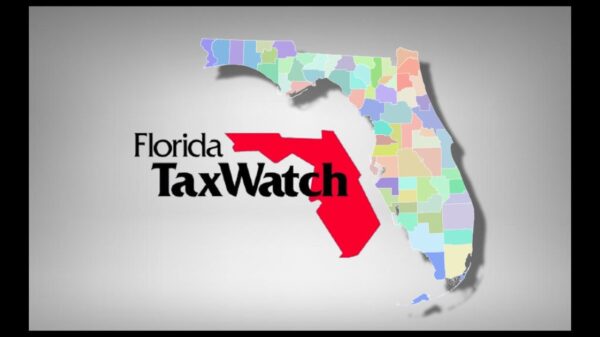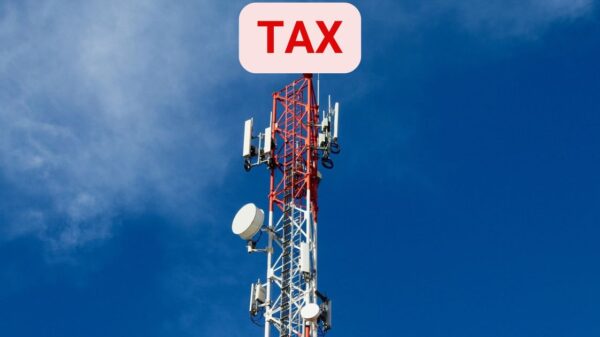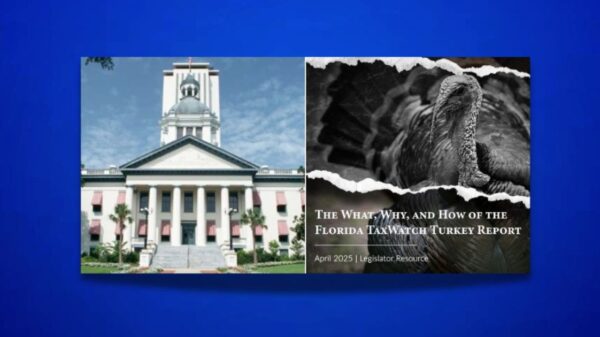On Thursday, Florida TaxWatch released a list of taxpayer priorities for the 2022 Legislative Session, which begins next Tuesday, January 11 and adjourns on Friday, March 11.
The list reflects a range of issues that the independent, nonpartisan research institute dedicated to serving as “the eyes and ears of Florida’s taxpayers” has examined and will continue to closely monitor during the upcoming session. It includes:
Maintaining Discipline and Accountability Throughout the Appropriations Process, Especially as the State Allocates Federal Relief Funds
Addressing Adverse Tax Policies and Costly Legislation Impacting Florida Businesses
Investing in Programs and Infrastructure to Ensure Florida Remains Competitive
Focusing on the Critical Health, Human Services,
and Employment Needs as Florida Responds to the Changes Spurred by the Pandemic
Florida TaxWatch President and CEO Dominic Calabro weighed in on his organization’s priorities.
“Despite the COVID-19 pandemic, Florida is in an enviable fiscal condition. The state’s current budget is record in size, as are our budget reserves. Revenue collections are back above pre-pandemic levels, and this Legislature will have even more revenue available for the next budget, including billions of dollars in unappropriated federal funds. This is an unexpected success that Florida TaxWatch attributes to the significant influx of federal stimulus dollars and steps taken by Governor DeSantis, Senate President Simpson, and House Speaker Sprowls, demonstrating fiscal prudence and focusing on the economy while also making strategic investments to address critical issues with statewide impact, such as nursing shortages,” Calabro said.
“To preserve this momentum in 2022, Florida TaxWatch is hopeful the Legislature will concentrate on specific measures that our research has proven will benefit communities, businesses, and the state economy overall. We are proud to present these taxpayer priorities today and look forward to providing additional information and evidence-based recommendations, as appropriate, in the days ahead,” he added.
Florida TaxWatch unveiled the following priorities on Thursday:
Maintaining Discipline and Accountability Throughout the Appropriations Process, Especially as the State Allocates Federal Relief Funds
As outlined in Florida TaxWatch’s October 2021 report, Florida has received tens of billions of federal stimulus dollars from the six COVID- 19 stimulus packages since the onset of the pandemic, and more federal dollars will soon become available. While there is legitimate concern about the impact of such spending on the national deficit and whether Florida has received its fair share, the state is in a strong financial condition and has an opportunity to focus investments into targeted strategies that position the state for future growth. Last year, Florida TaxWatch partnered with the Florida Council of 100 and other business organizations to prepare recommendations for use of unallocated relief dollars.
Leaders of each chamber are to be commended for their thoughtful and thorough consideration of critical funding needs last session, as well as their focus and restraint regarding the allocation of stimulus dollars. Florida TaxWatch urges these legislative leaders to maintain transparency and accountability throughout this year’s appropriations process, including restraint in funding member projects. They must also be cautious not to overcommit non-recurring revenue to recurring expenses and strive to keep a higher-than-average level of reserves, while still continuing to make needed investments.
Addressing Adverse Tax Policies and Costly Legislation Impacting Florida Businesses
The Florida Legislature is positioned to pass along a significant Corporate Tax Increase, approximately $1 billion this year, unless it takes swift action. As noted in an October 2021 briefing, Florida TaxWatch encourages legislators to act immediately to prevent the scheduled corporate income tax increase (a raise to 5.5 percent).
Florida TaxWatch will also be watching to ensure that lawmakers quickly adopt a fix to the federal provisions related to Qualified Improvement Property (QIP), a “glitch” driven by a drafting error in the Tax Cuts and Jobs Act that resulted in a 39-year depreciation schedule for improvements to the interior of nonresidential buildings, instead of the intended 15 years. The Legislature should also reverse the elimination of the “like-kind” exchange provision, which allowed taxpayers to defer a gain when business personal property was exchanged for similar property. Not only do these provisions raise barriers to business investments, but they also increase costs and require burdensome adjustments to how companies keep assets on their books, at times well beyond the period where the investment has been taken out of service.
Additionally, Florida TaxWatch will be monitoring how the Legislature addresses the issues raised last session related to Consumer Data Privacy. While Florida TaxWatch strongly supports protection of personal information and data, independent research conducted by the government watchdog notes that costs associated with the consumer data privacy legislation originally proposed in 2021 could run between $6.2 billion and $21 billion in the first year alone, with an ongoing annual compliance cost of at least $4.6 billion. Florida TaxWatch recommends the Legislature consider the impact of the implementation and maintenance burdens imposed on businesses by the bill and, if passed, provide covered businesses ample time to comply with new regulations. It should also be a priority to remove the costly private right of action provision in the bill.
The Legislature should also address the lack of clarity that exists related to government leaseholds, which is allowing some local tax collectors to impose significant and unexpected tax burdens on businesses providing critical services at certain air, sea, and spaceports in Florida.
Investing in Programs and Infrastructure to Ensure Florida Remains Competitive
Florida TaxWatch continues to call for support to promote tourism, business recruitment, economic development, and workforce development, and encourages continued support for Enterprise Florida and VISIT FLORIDA.
Additionally, as reported in Florida TaxWatch’s September 2021 analysis, the Qualified Target Industry (QTI) tax refund program, which expired on June 30, 2020, should be reauthorized by lawmakers, enabling the state to directly compete with Texas, Georgia, North Carolina, and others to attract companies in high value-added industries that are considering settling or expanding their operations.
Florida TaxWatch also supports strategies to regain and sustain Florida’s film and entertainment industry, including provision of tax credits to movie and television productions that produce jobs in Florida.
The pandemic has proven that Broadband is essential to health, education, and enterprise. Florida must continue working to close the digital divide and especially minimize the impact on Florida’s rural communities. Lawmakers are encouraged to focus on increasing broadband deployment in unserved and underserved communities; providing support for access to infrastructure and poles; supporting the Office of Broadband created within the Florida Department of Economic Opportunity; taking advantage of the funding available through the federal Capital Projects Fund; and advancing strategies to encourage investment, including tax exemptions for broadband equipment.
Focusing on the Critical Health, Human Services, and Employment Needs as Florida Responds to the Changes Spurred by the Pandemic
COVID-19 continues to impact Florida businesses, and Florida TaxWatch renews its call for continued liability protections for responsible Florida businesses. The pandemic has highlighted the opportunity – and the need – to make telehealth as accessible as practicable. Telehealth helps reach audiences that may otherwise be unable to access care and provides the opportunity to improve patient care, treatment, education, and services, while ultimately bending the cost curve. Florida should eliminate the remaining barriers to expanding telehealth.
Finally, the programs that support and protect those at risk are at risk themselves as employment shortages and a spike in wages have left many caregiver and safety and security organizations in a precarious position. The Legislature should find ways to support and address challenges faced by workforce shortages in critical areas such as health and elder care, childcare, services for vulnerable children and families, education, and corrections.






















